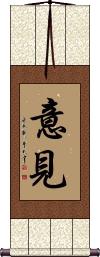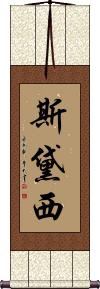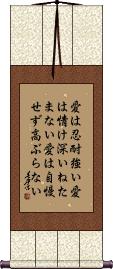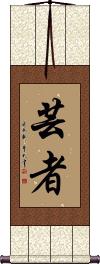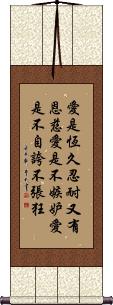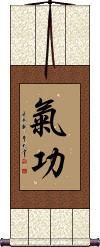Many custom options...
And formats...

Opinion in Chinese / Japanese...
Buy an Opinion calligraphy wall scroll here!
Personalize your custom “Opinion” project by clicking the button next to your favorite “Opinion” title below...
Idea / Thought
意見 means idea, thought, opinion, or view in Japanese.
This word also has a similar meaning in Chinese, just often used in China.
Stacey
Corinthians 13:4
愛は忍耐強い。愛は情け深い。ねたまない。愛は自慢せず、高ぶらない。is 1st Corinthians 13:4 in Japanese.
In English, this reads:
1st Corinthians 13:4 (KJV) Charity suffereth long, and is kind; charity envieth not; charity vaunteth not itself, is not puffed up...
1st Corinthians 13:4 (NIV) Love is patient, love is kind. It does not envy, it does not boast, it is not proud.
1st Corinthians 13:4 (Basic English) Love is never tired of waiting; love is kind; love has no envy; love has no high opinion of itself, love has no pride.
If you want a big “love” character written above the verse on your artwork, just make a note in the “special instructions” tab when you are customizing your artwork. There is no extra charge for that service on this special verse.
Note: Because this selection contains some special Japanese Hiragana characters, it should be written by a Japanese calligrapher.
Geisha
芸者 is the real basis for the way we spell geisha.
However, there are many more ways to refer to a woman that fills the role that westerners think of when they hear the word geisha.
In Japanese, these characters literally mean “artful person.” But in English, it might be better translated as “a person (woman) highly trained/accomplished in the arts.”
However, my Japanese dictionary says “a singing and dancing girl.”
Many will argue as to whether “geisha” = “prostitute” or not. My Japanese friends seem to have the opinion that a geisha is so highly trained in the art of playing musical instruments and dancing that the fact she might also be a prostitute is secondary to her performance on stage.
芸者 is a “Japanese only” term, they use a slightly different first character to express “geisha” in Chinese. Since this is a Japanese term, I have not included the Chinese version.
Corinthians 13:4
All you need to know about LOVE
愛是恆久忍耐又有恩慈愛是不嫉妒愛是不自誇不張狂 is 1st Corinthians 13:4 in Chinese.

With large “love” character added.
In English, this reads:
1st Corinthians 13:4 (KJV) Charity suffereth long, and is kind; charity envieth not; charity vaunteth not itself, is not puffed up...
1st Corinthians 13:4 (NIV) Love is patient, love is kind. It does not envy, it does not boast, it is not proud.
1st Corinthians 13:4 (Basic English) Love is never tired of waiting; love is kind; love has no envy; love has no high opinion of itself, love has no pride.
The Chinese translation follows the love meaning, rather than the King James' use of “charity.” I was a little confused when writing this description with the significant differences between the NIV vs. KJV translations. After speaking to a Greek scholar about this, it would seem that the KJV has an almost errant translation with the use of “charity” in place of “love.”
We used the most popular Christian Chinese Bible, which is the Chinese Union Version (CUV). The CUV was first published in 1919. We use this so that the Chinese translation would be as accurate and standard as possible. Any Chinese Christian worth their salt will easily be able to identify this verse when they see these characters.
If you want a big “love” character written above the verse on your artwork, just make a note in the “special instructions” tab when you are customizing your artwork. There is no extra charge for that service on this special verse.
Qi Gong / Chi Kung
氣功 or Qigong is the title of a technique that is somewhere between medical practice, meditation, and in some cases, religion.
The definition is blurred depending on which school of Qigong you are following. In some cases, it is even incorporated with martial arts.
Some people (even Chinese people) mix this title with Tai Chi (Tai Qi) exercises.
Lately, in China, people will claim to practice Tai Chi rather than Qigong because the Qigong title was recently used as a cover for an illegal pseudo-religious movement in China with the initials F.G. or F.D. (I can not write those names here for fear of our website being banned in China).
You can learn those names and more here: Further info about Qigong
If you are wondering why I wrote “Qi Gong” and “Chi Kung” as the title of this calligraphy entry, I should teach you a little about the various ways in which Chinese can be Romanized. One form writes this as “Chi Kung” or “Chikung” (Taiwan). In the mainland and elsewhere, it is Romanized as “Qi Gong” or “Qigong.” The pronunciation is the same in Taiwan, mainland, and Singapore Mandarin. Neither Romanization is exactly like English. If you want to know how to say this with English rules, it would be something like “Chee Gong” (but the “gong” has a vowel sound like the “O” in “go”).
Romanization is a really confusing topic and has caused many Chinese words to be mispronounced in the west. One example is “Kung Pao Chicken,” which should actually be more like “Gong Bao” with the “O” sounding like “oh” for both characters. Neither the Romanization system in Taiwan nor the Mainland is perfect, in my opinion, and leads to many misunderstandings.
In modern Japan, you may see this written as 気功, but the original 氣功 is still recognized. If you need the Japanese version, please contact me.
These search terms might be related to Opinion:
1. Right Understanding / Right Perspective / Right View / Perfect View
Belief / Trust
Firm Belief / Strong Faith
Indomitable Spirit / Indomitable Attitude
Positive Attitude
Purified Spirit / Enlightened Attitude
Trust in God / Belief in God
Not the results for opinion that you were looking for?
Below are some entries from our dictionary that may match your opinion search...
| Characters If shown, 2nd row is Simp. Chinese |
Pronunciation Romanization |
Simple Dictionary Definition |
固執 固执 see styles |
gù zhí gu4 zhi2 ku chih koshitsu(p); koshuu / koshitsu(p); koshu こしつ(P); こしゅう |
More info & calligraphy: Persistence(n,vs,vt,vi) sticking to (an opinion, theory, belief, etc.); clinging to; adherence; persistence; insistence |
意見 意见 see styles |
yì jiàn yi4 jian4 i chien iken いけん |
More info & calligraphy: Idea / Thought(1) opinion; view; comment; (n,vs,vt,vi) (2) scolding; reprimand; rebuke; admonition; cautioning; warning Thoughts, ideas, concepts, views. |
激烈 see styles |
jī liè ji1 lie4 chi lieh gekiretsu げきれつ |
More info & calligraphy: Fierce(noun or adjectival noun) violence; vehemence; fury; fervour; fervor; severity; fierceness; keenness |
ホール see styles |
pooru ポール |
(opinion) poll; (place-name, surname) Pool; Poel; Pohl; Pol; Pole; Powle; Poole |
頑張る see styles |
ganbaru がんばる |
More info & calligraphy: Fortitude / Steadfast |
夫 see styles |
fú fu2 fu pu ぷ |
(classical) this, that; he, she, they; (exclamatory final particle); (initial particle, introduces an opinion) (1) (archaism) my dear; dear; honey; (2) (kana only) garnish (esp. one served with sashimi); (3) (kana only) embellishment; (1) (archaism) that; (2) (archaism) he; she; that person; husband; (n-pref,n-suf,n) (1) male; man; (2) (archaism) husband; (surname) Pu A man; a sage, officer, hero; a husband, mate; a fellow; a particle, i. e. for, so, etc. |
異 异 see styles |
yì yi4 i i い |
different; other; hetero-; unusual; strange; surprising; to distinguish; to separate; to discriminate (noun or adjectival noun) (1) difference (of opinion); (adjectival noun) (2) strange; odd; unusual; (prefix) (3) different pṛthak. Different, separate, unlike, not the same; diverse, diversity; strange; heterodox; extraordinary. |
表 see styles |
biǎo biao3 piao hyou / hyo ひょう |
exterior surface; family relationship via females; to show (one's opinion); a model; a table (listing information); a form; a meter (measuring something) (n,n-suf) (1) table; chart; list; (2) memorial to an emperor; (surname) Hyōsaki Indicate, manifest, express, expose; external. |
説 说 see styles |
shuō shuo1 shuo setsu せつ |
variant of 說|说[shuo1] (n,n-suf) (1) theory; doctrine; (2) opinion; view; (3) rumour; rumor; gossip; hearsay; (female given name) Toku |
論 论 see styles |
lùn lun4 lun ron ろん |
opinion; view; theory; doctrine; to discuss; to talk about; to regard; to consider; per; by the (kilometer, hour etc) (n,n-suf) (1) argument; discussion; dispute; controversy; discourse; debate; (n,n-suf) (2) theory (e.g. of evolution); doctrine; (n,n-suf) (3) essay; treatise; comment; (surname) Ron To discourse upon, discuss, reason over; tr. for śāstra, abhidharma, and upadeśa, i.e. discourses, discussions, or treatises on dogma, philosophy, discipline, etc. |
議 议 see styles |
yì yi4 i gi ぎ |
to comment on; to discuss; to suggest (1) discussion; deliberation; (2) thought; opinion; (given name) Hakaru to speak |
一說 一说 see styles |
yī shuō yi1 shuo1 i shuo |
an expression of opinion; according to some |
一説 see styles |
issetsu いっせつ |
one theory; one opinion; another theory |
世評 see styles |
sehyou / sehyo せひょう |
reputation; public opinion |
世論 世论 see styles |
shì lùn shi4 lun4 shih lun seron よろん |
public opinion worldly discussions; ordinary unenlightened ways of description or definition; also styled 惡論 evil discussions, especially when applied to the hedonistic lokāyatika teachings, v. 路迦. |
主張 主张 see styles |
zhǔ zhāng zhu3 zhang1 chu chang shuchou / shucho しゅちょう |
to advocate; to stand for; view; position; stand; proposition; viewpoint; assertion; CL:個|个[ge4] (noun, transitive verb) claim; insistence; assertion; advocacy; emphasis; contention; opinion; tenet assertion, claim |
主意 see styles |
zhǔ yi zhu3 yi5 chu i shui しゅい |
plan; idea; decision; CL:個|个[ge4]; Beijing pr. [zhu2 yi5] main meaning; opinion; idea; aim; motive; gist; meaning |
主見 主见 see styles |
zhǔ jiàn zhu3 jian4 chu chien |
one's own view; definite opinion |
主観 see styles |
shukan しゅかん |
(1) subjectivity; subject (philosophical); ego; (2) one's personal opinion; one's own idea |
二話 二话 see styles |
èr huà er4 hua4 erh hua |
objection; differing opinion |
以為 以为 see styles |
yǐ wéi yi3 wei2 i wei |
to think (i.e. to take it to be true that ...) (Usually there is an implication that the notion is mistaken – except when expressing one's own current opinion.) |
俗眼 see styles |
zokugan ぞくがん |
popular opinion |
俗見 see styles |
zokken ぞっけん |
popular view; laymen's opinion |
俗論 see styles |
zokuron ぞくろん |
popular opinion |
俗議 see styles |
zokugi ぞくぎ |
popular opinion |
俺的 see styles |
oreteki おれてき |
(adjectival noun) (masculine speech) (colloquialism) my personal (e.g. opinion) |
僕的 see styles |
bokuteki ぼくてき |
(adjectival noun) (masculine speech) (colloquialism) my personal (e.g. opinion) |
僻説 see styles |
hekisetsu へきせつ |
(form) prejudiced opinion; illogical view |
僻論 see styles |
hekiron へきろん |
prejudiced opinion |
党論 see styles |
touron / toron とうろん |
view of a political party; party opinion; party platform |
Click here for more opinion results from our dictionary
The following table may be helpful for those studying Chinese or Japanese...
| Title | Characters | Romaji (Romanized Japanese) | Various forms of Romanized Chinese | |
| Idea Thought | 意見 | i ken / iken | yì jiàn / yi4 jian4 / yi jian / yijian | i chien / ichien |
| Stacey | 斯黛西 | sī dài xī si1 dai4 xi1 si dai xi sidaixi | ssu tai hsi ssutaihsi |
|
| Corinthians 13:4 | 愛は忍耐強い。愛は情け深い。ねたまない。愛は自慢せず、高ぶらない。 | ai ha nintai tsuyoi. ai ha nasakebukai. netama nai. ai ha jiman se zu, takabura nai. | ||
| Geisha | 芸者 | geisha | yún zhě / yun2 zhe3 / yun zhe / yunzhe | yün che / yünche |
| Corinthians 13:4 | 愛是恆久忍耐又有恩慈愛是不嫉妒愛是不自誇不張狂 爱是恒久忍耐又有恩慈爱是不嫉妒爱是不自夸不张狂 | ài shì héng jiǔ rěn nài yòu yǒu én cí ài shì bú jì dù ài shì bú zì kuā bù zhāng kuáng ai4 shi4 heng2 jiu3 ren3 nai4 you4 you3 en2 ci2 ai4 shi4 bu2 ji4 du4 ai4 shi4 bu2 zi4 kua1 bu4 zhang1 kuang2 ai shi heng jiu ren nai you you en ci ai shi bu ji du ai shi bu zi kua bu zhang kuang | ai shih heng chiu jen nai yu yu en tz`u ai shih pu chi tu ai shih pu tzu k`ua pu chang k`uang ai shih heng chiu jen nai yu yu en tzu ai shih pu chi tu ai shih pu tzu kua pu chang kuang |
|
| Qi Gong Chi Kung | 氣功 气功 | ki kou / kikou / ki ko | qì gōng / qi4 gong1 / qi gong / qigong | ch`i kung / chikung / chi kung |
| In some entries above you will see that characters have different versions above and below a line. In these cases, the characters above the line are Traditional Chinese, while the ones below are Simplified Chinese. | ||||
Successful Chinese Character and Japanese Kanji calligraphy searches within the last few hours...
